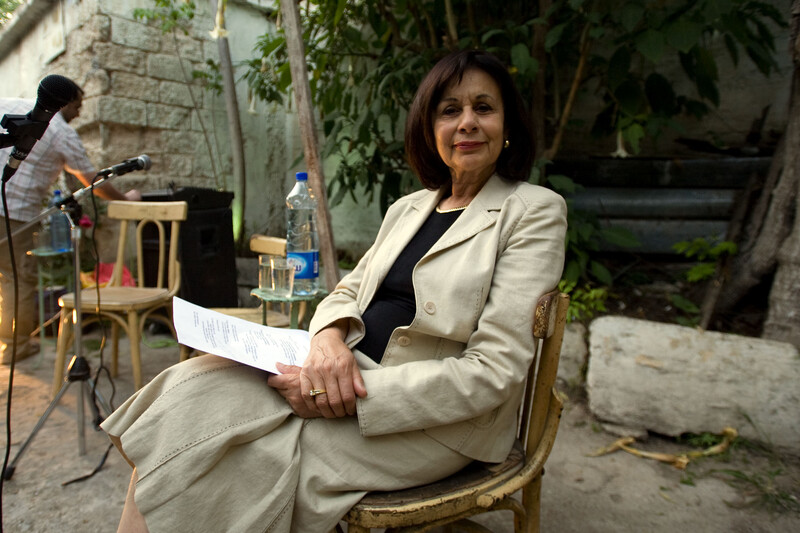Lobby Watch 8 December 2016

Palestinian academic Ghada Karmi is set to speak at the conference. (PalFest/Flickr)
An academic conference about Israel banned in the UK two years in a row, will go ahead at a new venue in Ireland, organizers announced this week.
“International Law and the State of Israel: Legitimacy, Responsibility and Exceptionalism” had been due to take place at the University of Southampton in April 2015.
But it was cancelled at short notice after the university came under intense pressure from UK government ministers and Israel lobby groups.
Southampton academic and organizer Oren Ben-Dor told The Electronic Intifada on Wednesday that University College Cork would instead host the conference in the spring of 2017.
“We had to move a country to do it,” Ben-Dor said, arguing that administrators at Southampton are “on the wrong side of history” for suppressing freedom of speech on Israel.
He said the conference organizers’ legal case was still ongoing and they are in the process of appealing earlier rulings that favored the university.
“Bullying and threats”
Meanwhile, the list of academic participants in the Cork conference includes prominent Palestinian and Israeli figures, such as historian Ilan Pappe; Palestinian academic and former member of Israel’s parliament Azmi Bishara and authors and academics Ghada Karmi and Victor Kattan.
Those calling for the “controversial” conference to be shut down had claimed it was one-sided. Pro-Israel organization the Board of Deputies of British Jews led the charge to have it cancelled, saying it was “an international gathering of anti-Zionists who were using the cover of a distinguished university.”
The director of research at the university’s school of law wrote at the time that the cancellation occurred because of “the bullying and threats of the Israeli lobby” and that the university’s capitulation was “outrageous.”
Israel lobbyists claimed responsibility for having the original conference cancelled, with one openly telling The Jewish Chronicle that the reasons given for the cancellation were a pretext.
Ben-Dor emphasized that pro-Israel academics are also scheduled to take part in the conference – as they had been in the original event.
These include the hard-right Zionist historian Geoffrey Alderman and Alan Johnson of Israel lobby public relations firm the Britain Israel Communications and Research Centre.
Legal route
In April 2015, organizers took the University of Southampton to the High Court in London arguing that the cancellation of the event was a violation of free speech.
The university claimed the conference was not banned but only “postponed.” The judge sided with the university.
But in March this year, the university cancelled the conference once again. This time they cited “risk” to participants due to potential pro-Israel or other protests – despite the fact that organizers undertook to hold no counter-protest.
Lawyers acting for the organizers argued that the university had imposed onerous conditions including almost $30,000 in security costs which the university was refusing to cover.
The High Court in April again sided with the university.
Ben-Dor said on Wednesday that if upheld, this precedent would mean “only rich people can run controversial conferences” and that “any thug out there can silence” them simply by threatening to hold a demonstration.
The University of Southampton has refused to release correspondence with pro-Israel groups and others regarding the conference requested under the Freedom of Information Act by The Electronic Intifada. The university claimed that releasing documents, even redacted, to a publication based in the United States would breach data protection provisions in UK law.






Comments
Israel conference banned
Permalink Guy replied on
And on and on it goes ,money trumps freedom of speech .Money and well placed lobbying in high places.
silence getting louder
Permalink tom hall replied on
When a conference is forced to relocate to University College Cork, not exactly a utopian enclave of civic enlightenment, you realise how grim things have become in Britain. Even the inclusion of some of the harshest voices in the pro-Israel camp wasn't enough to allow the event to go on at Southampton. The problem wasn't how many Zionists had to be given a platform, but rather how to exclude serious critical voices altogether. Imagine being terrified of the words of Ghada Karmi, or Ilan Pappe. But that sums up the attitude of the Board of Deputies of British Jews. Of course, as the role of Zionist censorship becomes more conspicuous in the general society, greater support builds for the Palestinian cause throughout Britain. The Israeli state is right to be worried. Their tools of repression merely demonstrate the truth and spread the word.
Then let the Irish benefit from holding the conference
Permalink Eliza replied on
Then let University College Cork have the prestige of holding the conference and the Irish benefit from the touring academic dollar.
The High Court decision to uphold the University 'postponement' is shameful. The whole process of denying the Conference twice under the guise of concern for the safely of the participants/pro-Israeli protesters is shameful and is worthy of its own short doco.
The UK Zionist lobby and the capitulation of others can make life a bit more difficult for those who do not slavishly adhere to the Zionist narrative. But ultimately they cannot stop this discussion and those who do capitulate, like the University of Southamption, will and should suffer damage to their academic standing. There are no free lunches.
"INTERNATIONAL LAW AND THE STATE OF ISRAEL" CONFERENCE AT CORK .
Permalink DIPAK RAJGOR replied on
I understand that this conference has had to be calcelled because of the decision made by the Management Team at Cork University College. Can someone please post details if the conference goes ahead in March or anytime in the future.
it's still on
Permalink tom hall replied on
Here's a link to an update, posted this month- I'm not sure of the date it went up.
https://israelpalestinelaw.com/
They're saying it's definitely on. I would be very surprised if having accepted and helped in organising the conference, the university backed out at this point. And frankly, Zionist pressure isn't quite as effective in Ireland as in the U.K.